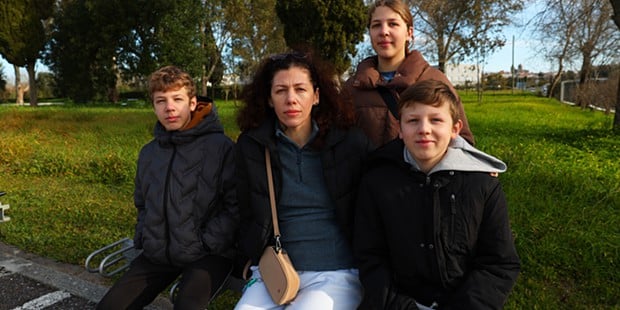Far from home and family for almost a year, a Ukrainian woman and her three children are safe from war and remake life in Evora, but dream of returning to their country.
In April 2022, when she spoke to Lusa news agency for the first time, Liudmyla Simochova could only pronounce herself in Ukrainian, which required the help of a translator. Now, almost a year later, she can ‘scratch’ Portuguese and make herself understood.
“When the war is over, I will go back to my country,” says the refugee, who attended a course in Evora to learn the language.
Liudmyla and her three children – Luca, David and Violetta – left the Ukrainian capital Kiev, where they lived, in early March 2022, shortly after the beginning of the Russian invasion of the country, and have been living in Évora since April last year.
When they arrived in the Alentejo city, they went to live with a Dutch couple, and now they are in a farmhouse located on the outskirts of the city, borrowed for a few months by the owner.
As she gives the interview, the Ukrainian opts to speak in English, because she feels more comfortable and is not yet fluent in Portuguese, and tells Lusa that she arrived in Portugal by car. She expected to stay a short time, but the continuity of the war made her change her mind.
“I didn’t intend to stay six months or 10 months, but now I look at my country and, for example, I know that they launched ‘rockets’ in Kiev, in my city, in my area. I read about it in the news, and if I go back, I don’t know what can happen,” he emphasizes.
With no plans for how long she will remain away from home and family, Liudmyla, 45 years old and divorced, says she knows for sure that one day, when the thunder of the Russian invasion of Ukraine is silenced, she wants to return to her country, where her mother and sister stayed.
For now, she is still in Portugal, because the war is not over: “I now live here, I have adapted, I learn the language, I finished Portuguese levels A1 and A2, and I try to speak, adapt, and find new friends for my family, for my children,” she stresses, praising the Portuguese, “very kind and open.
As for the choice of country, Liudmyla says she “didn’t want to stay close” to Ukraine, for not knowing “if the war changes” and “starts in another neighboring country,” and refuses a new move, because this option “is like starting all over again.
The refugee works at the Aminata swimming club, cleaning, and her children go to school. Violetta, 17, and David, 15, are at Severim Faria Secondary School, while Luca, the youngest, 12, is at Manuel Ferreira Patrício Elementary School.
Despite the help he received from the Portuguese and his love for the country, ‘not everything is roses’. The two older children, both in the 10th grade, have had a difficult adaptation and ‘still have no friends at school’.
“It’s difficult because now they are no longer children,” she says, indicating that Violetta and David even “speak with Portuguese children, but not much,” if only in English, but their friends “stayed in Ukraine. With them, they keep in touch by phone or ‘online’.
As for Luca, who is in the 6th grade, adaptation “is easier”, because, besides speaking “a little” English, he “tries to speak Portuguese too” and, with a “mixture of English and Portuguese”, he already “has many friends”.
Like her youngest son, Liudmyla also says she has already made new friends in Portugal, especially at work and in the neighborhood, and is already thinking of returning to the area where she used to work in the Ukrainian capital, where she was a sales manager in a real estate company.
“When I start speaking Portuguese, I might try to be a sales manager in Portugal too,” he adds.
Sparse in words, young Luca tells Lusa that he likes his school and that he has “good Portuguese friends and teachers” there, admitting that “maybe when the war is over I will go back to Ukraine.”
Russia invaded Ukraine on February 24, 2022, almost a year ago, with the argument that it wanted to “denazify” and “demilitarize” the neighboring country.
The war — called a “special military operation” by Moscow — has been condemned by so-called Western countries, which have been sending arms to help Kiev fight Moscow, as well as imposing sanctions on Russian companies, industries and personalities.

